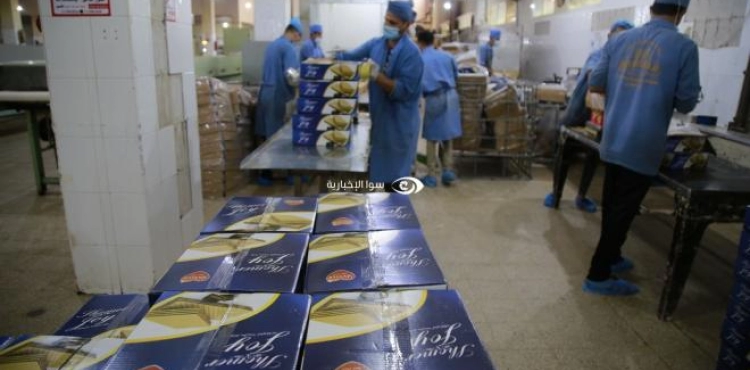Nidal and Yasser fear that their factory, which produces food in the central Gaza Strip, will be shut down due to the continued closure of the Karam Abu Salem crossing from the beginning of the recent Israeli aggression against the Gaza Strip until the moment.
The two workers have been supporting eight individuals and have been working in Schumer´s pastry and amusements for a long time, where they are concerned that their only source of livelihood has stopped.
"If the factory stops, we will join the large unemployment army in the Gaza Strip, we will lose our only source of blue, and we will not be able to provide a living for our families and children," the worker said.
"After the recent Israeli aggression against Gaza, we work on a daily basis, sometimes sitting in our homes, to stop some production lines in the factory."
"Under the current circumstances, the livelihood has become very difficult because of the continued closure of the Karam Abu Salem crossing and the suspension of production lines at the factory," said Yasser.
"We will not be able to manage our lives, under very difficult economic conditions, because working in the factory here is our only source of glaucoma," he said.
Youssef Yassin Schumer, owner of Schumer´s sweets and amusements factory, says he was forced to shut down some production lines at the plant because raw and basic materials were not introduced as a result of the continued closure of the Karam Abu Salem crossing.
He points out that there are six production lines in the factory, some of which have been stopped since the recent Israeli aggression against Gaza, and others that will be stopped within the next few hours because of the lack of raw and basic materials, due to the closure of the crossing..
He explains that some food products are manufactured and processed about 25 raw materials and basic items, a large part of which is now banned from entering, due to the closure of the crossing.
Schumer said the plant employed 120 workers in 2012, and began to reduce the number of workers over the past years, as a result of the difficult economic conditions in the Palestinian market in the Gaza Strip, reaching 50 today.
He added that the factory produces food of all kinds, daily, where the financial cost is estimated at between 15,000 and 22,000 Israeli shekels, equivalent to 6,000 U.S. dollars.
Schumer´s factory was not spared the recent Israeli aggression against the Gaza Strip, part of which was damaged by Israeli raids on agricultural land around it.
The owner of the factory points out that there were direct losses as a result of the aggression estimated at 140,000 U.S. dollars, due to damage to parts of the factory as a result of the Israeli raids.
Schumer calls on the international community, the European Union and all stakeholders to intervene immediately and quickly to reopen gaza crossings normally so that food factories can continue to operate and not stop working at all.
Tayseer al-Safadi, president of the Food Industry Federations in the Gaza Strip, said there were 140 food factories in the Gaza Strip, 60 of which were operating, before israel´s recent aggression against Gaza.
Safadi said 40 factories were targeted during the recent aggression against Gaza, 20 of them in total and 20 in part.
He said the factories employed between 1,500 and 1,600 workers, a large part of whom were laid off, particularly those who worked in factories targeted in the recent aggression.
"The factories that were targeted stopped working completely, while the factories that remained in operation are threatened with suspension, because raw materials are not allowed to be introduced due to the closure of the Karam Abu Salem crossing."
He said some factories have a small portion of the raw materials, but after a week they may stop working once and for all.
"The suspension of food factories has caused increased unemployment, due to layoffs, as well as the failure of their owners to commit to paying banks´ financial obligations," safadi said.












